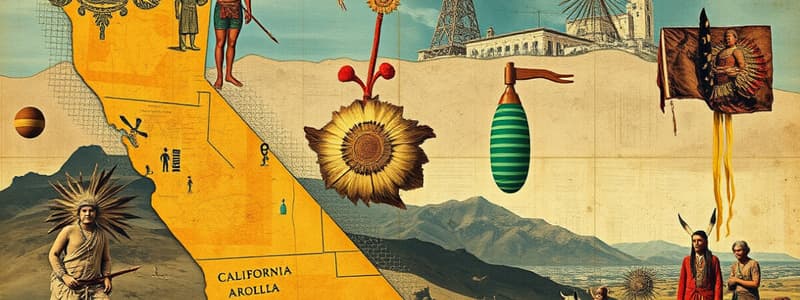Podcast
Questions and Answers
Which food source was primarily relied upon by coastal groups in northern California?
Which food source was primarily relied upon by coastal groups in northern California?
- Acorns
- Salmon (correct)
- Deer
- Shellfish
California people only lived along the coast and did not inhabit inland areas.
California people only lived along the coast and did not inhabit inland areas.
False (B)
What was the primary method used by women to process acorns for consumption?
What was the primary method used by women to process acorns for consumption?
They harvested, shelled, and pounded the acorns into meal, rinsing it to remove bitterness.
California people relied heavily on _____ as a basic food source.
California people relied heavily on _____ as a basic food source.
Match the following types of homes with the areas they were built in:
Match the following types of homes with the areas they were built in:
What type of clothing did California people typically wear in colder months?
What type of clothing did California people typically wear in colder months?
California cultural region was home to fewer than 100 different groups.
California cultural region was home to fewer than 100 different groups.
Which plant materials did California people use for making clothing?
Which plant materials did California people use for making clothing?
The women used _____ to create beautiful baskets, often decorating them as well.
The women used _____ to create beautiful baskets, often decorating them as well.
What was the primary food source for groups living farther south along the coast?
What was the primary food source for groups living farther south along the coast?
Flashcards are hidden until you start studying
Study Notes
California Cultural Region
- Extends from southern Oregon to Baja California, showcasing diverse climates and landscapes.
- Winter rains are brought by ocean storms, while summers are predominantly hot and dry, especially inland.
- Encompasses coastlines, foothills, inland valleys, deserts, and the Sierra Nevada mountain range.
Indigenous Groups and Food Sources
- Home to over 100 different cultural groups, more than any other region in the U.S.
- Coastal groups in northern California primarily relied on salmon as a food source.
- Coastal inhabitants further south depended more on shellfish for sustenance.
- Inland groups hunted deer with bows and arrows and used snares for rabbits; they also captured ducks using nets.
- Gathering was vital, with roots, berries, pine nuts, and acorns constituting essential food.
- Acorns served as a staple food; women collected, shelled, and pounded them into meal, then processed the meal to remove bitterness.
Cooking Techniques
- Meal preparation involved rinsing acorn meal in water, followed by cooking using hot stones in a woven basket mix.
Clothing and Housing
- Women typically wore skirts or aprons made from grasses, plants, or leather strips; men and women used animal hides in winter for warmth.
- Housing styles varied based on environment:
- In forests, homes constructed from redwood bark formed cone shapes.
- In marshy areas, thick mats of reeds were woven over a framework of poles.
Basketry and Craftsmanship
- California people engaged in extensive basket weaving using plant materials for practical and decorative purposes.
- Items produced included cooking baskets, storage baskets, sifters, and fish traps.
- Baskets were often intricately designed, incorporating clamshells and bird feathers for decoration.
Studying That Suits You
Use AI to generate personalized quizzes and flashcards to suit your learning preferences.



